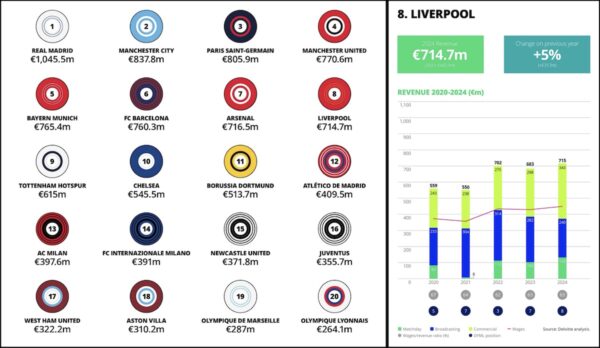Liverpool’s wage bill rose by a substantial £14 million in the 2023/24 season despite six top earners all leaving the club and only four new signings made.
The matter of contracts and wages has become an urgent one for Liverpool fans this season, owing to the ongoing talks with Mohamed Salah, Virgil van Dijk and Trent Alexander-Arnold.
It is remarkable, then, that the 2025 edition of the Deloitte Football Money League has revealed that the club paid out 63 percent of their revenue in wages for both players and staff in 2023/24.
That equates to around £387 million and stands at £14 million more than in the previous campaign.
This is despite the departures of Jordan Henderson, Roberto Firmino, Fabinho, James Milner, Alex Oxlade-Chamberlain and Naby Keita during that period, with only Dominik Szoboszlai, Alexis Mac Allister, Ryan Gravenberch and Wataru Endo brought in.

The combined wages of Henderson, Firmino, Fabinho, Milner, Oxlade-Chamberlain and Keita were reported to be around £860,000 per week, while Liverpool were also believed to have paid £55,000 per week for loanee Arthur’s wages.
In total, those departures would have seen Liverpool cut £47.58 million per year from their wage bill in the 2023/24 period.
Despite that the final wage bill stood at £14 million – or £270,000 per week – more, with little in the way of an obvious explanation for that sizeable increase.
Alisson became the third-highest earner at the club during that period due to a clause in his contract, lifting his wages to around £200,000 per week, while Kostas Tsimikas, Adrian, Jarell Quansah, Conor Bradley, Jayden Danns and Ben Doak signed new deals.
Szoboszlai and Mac Allister are reported to earn wages of between £100,000 and £120,000 per week, with Gravenberch realistically paid similar and Endo perhaps lower.


There were also changes off the field, too, most notably the short-term appointment of Jorg Schmadtke as sporting director.
But football finance expert Mo Chatra has expressed his opinion on X that the figure reported “makes no sense”:
“We know that player deals are heavily incentivised, with substantial bonuses related to Champions League participation. This was evidenced in 2017/18 – the club’s return to the competition that season coincided with a near 50 percent increase in the wage bill.”
Liverpool were, however, not in the Champions League last season, with Chatra adding: “Both Spurs and Chelsea‘s wage bills did drop in 2023/24; they, like Liverpool, fell out of the Champions League due to finishing outside of the top four in 2022/23.
“So given all of that, many questions about the wage bill will now arise – not least, who else was added to the wage bill during 2023/24 to result in an overall £14 million increase when it otherwise should have dropped by a not inconsiderable amount?”


There is a sense that perhaps this considerable increase was linked to the early departures of Jurgen Klopp and his backroom staff, but it is unclear if the club would have paid up any future wages owed given they chose to leave.
Deloitte’s Football Money League report placed Liverpool eighth in Europe despite their costly absence from the Champions League, with overall revenues of around £614 million.
That is an increase of £20 million from the previous tax year of 2022/23 (£594m) and largely attributed to a massive influx in commercial revenue, which was up 13.1 percent.










